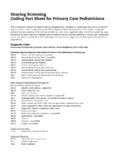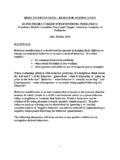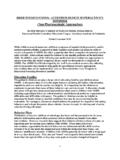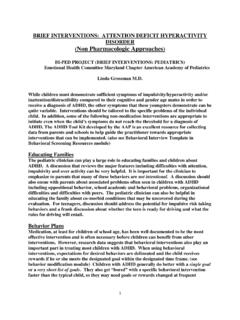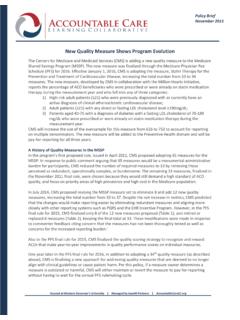Transcription of WEST MADISON STREET BALTIMORE MARYLAND T …
1 1 LAW OFFICES SCHWARTZ, METZ & WISE, A PROFESSIONAL ASSOCIATION 10 WEST MADISON STREET BALTIMORE , MARYLAND 21201 BALTIMORE ANNAPOLIS TELEPHONE: 410-244-7000 TELEPHONE: 410-269-1618 FACSIMILE: 410-332-4505 FACSIMILE: 410-269-5443 MDAAP Final Report April 12, 2010 The 427th Session of the MARYLAND General Assembly adjourned Sine Die at midnight on April 12th. It was a session dominated by election year rhetoric and challenging fiscal issues. Few policy issues of major importance were tackled. However, for the physician community, it turned out to be a very good year. Following is a summary of initiatives that were of specific importance to the pediatric community and/or were of general importance to the physician community as a whole.
2 MDAAP Initiated Legislation Obesity Visits and Developmental Screening House Bill 1017/Senate Bill 700 (Health Insurance Child Wellness Benefits) This legislation clarifies that the existing child wellness mandated benefit includes coverage for developmental screening and obesity evaluation and management visits. While some carriers had been appropriately covering developmental screening, CareFirst, the dominant carrier in the market, refused to reimburse for screenings. With respect to obesity visits, few carriers recognized the ICD-9 diagnosis code for obesity, forcing physicians to identify other diagnoses for these visits. Passage of this legislation should result in enhanced identification of children at risk for obesity related health issues and enhance the ability and willingness of pediatricians to conduct the recommended developmental screenings.
3 Statewide Advisory Commission on Immunization House Bill 411 (Statewide Advisory Commission on Immunizations Membership, Duties, and Sunset Repeal) The Statewide Advisory Commission on Immunizations becomes a permanent Commission as a result of passage of this legislation. In addition to removing the sunset, the bill adds a consumer and pharmacist member, creates three-year terms for all Commission members, specifies that the Commission Chair shall be appointed by the Secretary of DHMH and adds several important charges to the tasks of the Commission. The new charges include a review of: Potential provider reimbursement barriers to increasing immunizations; relative effectiveness of outreach programs that educate the public about the benefits of immunizations; potential cost-shifting of immunization expenses for privately insured patients who receive immunizations at public health departments; and the potential administrative burdens associated with State purchasing of vaccines.
4 The Commission 2 is also required to make recommendations on how to increase immunizations, including catch-up immunizations among adults, adolescents and children. The enactment of this legislation enhances the strength and relevance of the Commission and helps to ensure that it becomes a more effective tool for policy makers in shaping initiatives relevant to immunization policy in the State. Other Primary Care Specific Legislation There were a number of initiatives enacted that specifically address issues related to primary care services and physicians. The General Assembly is cognizant of the increasing shortage of primary care physicians and the access challenges that arise as a result of those shortages.
5 The legislation passed this year demonstrates recognition by the General Assembly that it must fix the challenges facing primary care if the State is ever to be successful in improving quality and controlling costs. The bills particularly germane to primary care are: Patient Centered Medical Home House Bill 929/Senate Bill 855 (Patient Centered Medical Home) Enactment of this legislation will enable the MARYLAND Health Care Commission to establish the Patient Centered Medical Home Demonstration Project that was approved by the Governor s Cost and Quality Council in December of 2009. The demonstration project will seek to involve a diverse cross section of the primary care physician community, including diversity of practice size, demographics and geography.
6 The Commission will develop regulations that address payment mechanisms, evaluation tools and other aspects of the program. It reflects the culmination of a two-year process that involved a broad range of stakeholders including the active participate of primary care physician specialties. The project has a five-year sunset but it is anticipated that data from the project will provide useful insights far in advance of the completion of the project. After Hours Care Reimbursement House Bill 435 (Health Insurance Reimbursement of Primary Care Providers Bonus Payments) As originally introduced, House Bill 435 proposed to require reimbursement for visits provided via email or telephonic communication.
7 In addition, it required reimbursement for after hours care. The provisions reflected issues incorporated into Recommendation No. 6 of the final report of the Governor s Task Force on Health Care Reimbursement. The MARYLAND Health Care Commission and the insurers raised questions regarding the email and telephone service part of the bill and these provisions were deleted. Given the uncertainty of telemedicine regulation by the Board of Physicians, there was no objection to the deletion of these provisions. The legislation as amended requires that an insurer must specifically address bonus payments for primary care physicians when they provide services to insureds between the hours of 6 and 8 , weekends and holidays.
8 The amount of the bonus payment is subject to negotiation with the insurer but must be specifically addressed in the contract. It reflects a desire 3 by the General Assembly to incentivize behavior that will reduce the inappropriate use of emergency department services and to enhance the compensation of primary care physicians. Annual Preventive Care Visits House Bill 878/Senate Bill 313 (Health Insurance Annual Preventive Care) In an effort to facilitate the scheduling of routine and preventive care, the passage of this legislation specifies that an insured can receive their annual preventive care visits at anytime during their plan year. The legislation s enactment will provide physician offices and their patients, flexibility in scheduling annual preventive services.
9 Annual preventive services include annual child wellness visits; routine gynecological visits; screening or exams for colorectal cancer, Chlamydia, HPV, prostate cancer, or breast cancer; and annual vision examinations. Scope of Practice Nurse Practitioners The Nurse Practitioners (NP s) introduced legislation (House Bill 319/Senate Bill 484 (State Board of Nursing Nurse Practitioners Certification Requirements and Authority to Practice) that would have abolished the requirement that the NP have a collaborative agreement with a physician. The physician community strongly opposed this measure. After the hearings, HGO Chairman Peter Hammen made clear to the NP s that the measure as introduced would not pass, while the Senate seemed more inclined to pass something close to what was introduced.)
10 After numerous meetings and amendments, the parties reached an agreement which preserves the requirement of collaboration between an NP and a physician. An NP must file an attestation with the Nursing Board that the NP has an agreement which sets forth a plan for collaborating and consulting with a physician, and for referrals. The regulations which will follow require the NP to identify the physician. This approach mirrors the approach adopted for Nurse Midwives in late 2009. The legislation also codifies the NP s scope of practice, which previously was only set forth in regulation, and allows the Board of Physicians to access an NP s attestation as needed.
